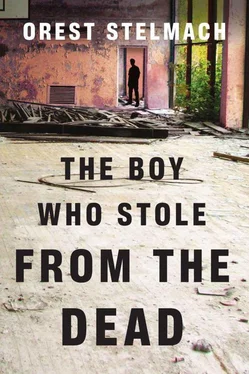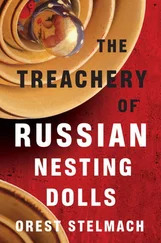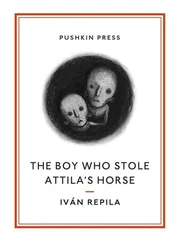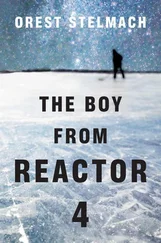“The loan for shares program gave the businessmen the right to acquire those companies if the government defaulted on the repayment of the loans.”
“Which was inevitable.”
“An auction was held. Only select businessmen were allowed to participate. The apparatchiks controlled the bidding process. It was a complete sham.”
“How much did the loan for shares scheme raise?”
“In the range of fifty billion dollars.”
“For all of Russia’s natural resources.”
“No. For all of Russian’s natural resources, metal industries, and telecommunications businesses.”
“That’s less than one third the value of General Electric.”
“A man should never sell state assets and drink vodka at the same time. Loan for shares gave birth to the oligarchs. When the world economy and commodity prices recovered, they joined the ranks of the richest men in the world.”
Nadia handed Obon another book. “Was Simeon Simeonovich one of them?”
“No. He bought his businesses one at a time from the others.”
“I’m surprised. If they were good businesses, why did they sell?”
“Because Putin told them to.”
“You’re kidding me.”
“No. There was an epic meeting among the oligarchs and Putin on July 28, 2000. By all accounts it was like something out of The Godfather . The oligarchs had gotten out of control. The conspicuous consumption, the arrogance. The population was sick of them. They were sheltering their income, avoiding taxes. They were complaining about corruption and inside dealing. Demanding social change.”
“To protect their money.”
“From the same lawlessness they used to earn their fortunes. Putin ordered the oligarchs to report to him regularly. As penalties for inappropriate behavior, he would demand certain businesses be sold from time to time. Otherwise he told them they could keep their gains if they paid their taxes, gave back to the community, and stayed out of politics.”
“And what if they didn’t?”
Obon grunted. “Let me put it this way. There’s an old Russian joke. Stalin’s ghost appears in a dream to Putin. He asks advice on how to lead the country. Stalin says, ‘Round up and shoot all the democrats, then paint the interior of the Kremlin blue.’ Putin frowns and says, ‘Why blue?’ Stalin smiles. ‘Ah,’ he says. ‘I knew you wouldn’t have a problem with the first part.’ ”
“I read that Simeonovich is close to Putin. Like Abramovich.”
“That’s why he’s been a beneficiary of some of the forced sales. He’s a Cossack. He loves Russia. He invested hundreds of millions to improve living standards in Siberia. And Putin has a soft spot for him for this reason.”
“If you were me, would you trust him?”
“You’re doing a job for him. It’s he that must trust you. Still, he’s not the worst of the lot. I’d put more faith in his word than Ivan Valentin’s, that’s for sure.”
“What did you find out?”
“An apparatchik . An agent of the Soviet apparatus. A lifetime communist bureaucrat. Born in 1940 in Kotelniki outside Moscow. Went to college at the Branch Kotelniki University of Nature. Got his start coordinating schedules for sanitation runs in Kootenai in 1967. Graduated to running the entire sanitation department in 1974. Promoted to second-in-command in Moscow in 1979. Credited with introducing the garbage compactor to the Soviet Union. Became head of sanitation in Moscow in 1981 and guest lecturer at Moscow University on the same topic. Moved to the Ministry of Atomic Energy in 1985 and became a member of the Ecology Committee. That was his post when the Soviet Union dissolved.”
“Atomic Energy? A sanitation worker?”
“He was in charge of nuclear waste disposal at Krasnoyarsk. A plutonium production site. Still a repository today for over a million and a half liquid curies of nuclear waste buried several hundred meters deep. They supply the local population with water out of storage tanks buried right next to the nuclear waste.”
“Nuclear waste?” Nadia’s ears perked up. No place had more nuclear waste than Chornobyl, Ukraine, where her uncle lived and Bobby visited. “Where is Krasnoyarsk?”
“Siberia.”
“Siberia.” Chornobyl, however, was a long way from Siberia. “His timber company is in Siberia.”
“A classic case of an old red director getting an inside deal in the loan for shares scheme.”
“But where would he have gotten the cash for the loan?”
“From his friends. Other apparatchiks . They’re all part of one cabal or another. He married twice. Divorced the first wife. One child. Ivan, born 1981. Moved to London in 1999 but kept homes near Krasnoyarsk and in Moscow. First wife died a few years ago during a trip back to Russia. No record of the cause of death.”
“But he was never posted in Ukraine.”
“No. But as a member of the Ecology Committee he was in charge of the clean-up of the Chornobyl nuclear plant disaster.”
Chills shimmied down Nadia’s spine. “Do you know if he travelled to Chornobyl?”
“That level of detail wouldn’t be found in the Politburo archives. You’d have to go to Kyiv and search the Central State Historical Archives yourself.”
Memories of her week in Kyiv flitted in and out of her mind. “I may do just that.”
CHAPTER 23

LAUREN SAT ACROSS from her boss, Richie Glass, in the Italian restaurant’s rustic dining room. The spices from the Tuscan steak exploded on Lauren’s tongue. The red wine tasted like the nectar of the gods. The kind and merciful gods. The ones who watched over her in jail cells in Big Diomede, Magadan, and Moscow. The ones who delivered her alive and in good health back home to Connecticut.
“When you said you were taking me to Toscana on a Monday night for early dinner I was touched,” she said. “I thought you’d be furious. I was afraid you’d fire me as soon as I walked in today.”
Richie lowered the glass from his lips. “Don’t be ridiculous. You know I respect you too much to do that.”
“I’m halfway there, Richie. He didn’t grow up in Alaska. He’s not from Kotzebue.”
“Who?”
“Bobby Kungenook. Who else?”
“Oh, right. Then where’s he from?”
“He entered the U.S. via Little Diomede Island and he crossed Big Diomede to get there.”
“I thought you said he’s not from Alaska.”
“He’s not. I didn’t say he was from Diomede. I said he entered the country via Diomede. Because he was coming in from Russia.”
“Russia?”
“Yes. He’s fluent in Russian and Ukrainian. And he entered the country via Little Diomede. What’s close to Little Diomede? Big Diomede. That’s Russian soil. Beyond that? Siberia. I think he might be Russian.”
“Russian? How did a kid named Bobby Kungenook end up in Russia?”
“I don’t think Bobby Kungenook is his real name.”
“Why not?”
“The real Bobby Kungenook vanished as a child. No one wants to talk about him. He doesn’t feel real.”
“What about his parents?”
“Supposed parents. They died eight years ago.”
“Maybe that explains it. There’s a big Russian influence in the Arctic Circle. Maybe he went to live with family in Russia. Or Ukraine. Or wherever.”
“No. If that was the case there’d be nothing to hide. There’d be no reason for a cop to threaten my life in Kotzebue, or show up on Little Diomede and send me on a one-way trip to Russia.”
“Right.” A shadow of doubt passed over Richie’s face. “Tell me how that supposedly went down again?”
Читать дальше













